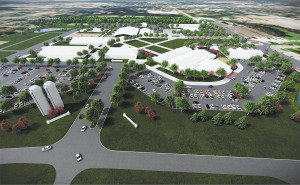Ben Inskeep: Centers likely will spur utility costs as AI makes slop
We’re already paying the price, both literally and figuratively, when it comes to AI data centers.
We’re already paying the price, both literally and figuratively, when it comes to AI data centers.

The Shelbyville-based developer previously attempted a data center project in Hancock County, but withdrew that proposal earlier this year after receiving significant community pushback.

IBJ talked with Lawrence about her 15 minutes of fame after her mention in a comedy bit on “The Tonight Show Starring Jimmy Fallon.”

Some Indiana counties have more than double the judicial officers needed to handle court cases, while others are understaffed, according to the state’s most recent weighted caseload report.

Boone County is looking to control its destiny as the Indiana Economic Development Corp. plans the 9,000-acre LEAP Research and Innovation District northwest of Lebanon.

A $65 million, three-phase expansion project begins this summer that will modernize the 40-acre site in Noblesville and enable it to host a wider variety of programming throughout the year.

Several neighbors denied entry to a Marion County Fair board meeting want city-county government to stop supplementing the private organization’s budget until the fair’s leadership agrees to an outside audit.
Mark Hall defeated five-term incumbent Hamilton County Councilman Steve Schwartz in the District 3 election. District 3 includes Noblesville, Jackson and White River Townships.
Hamilton County will likely have a new prosecutor next year as well-funded former radio talk show host Greg Garrison appeared headed to victory against a three-term incumbent in Tuesday’s Republican primary election.
Anderson served two terms as Marion County sheriff from 2003 to 2011. He also was U.S. marshal for the Southern District of Indiana from 1977 to 1981 and 1994 to 2001.
A Democrat-authored amendment aimed at ousting Marion County Democratic Party Chair Kate Sweeney Bell made it a step further this week when the Indiana House approved the elections bill it’s tacked onto. And the bill leaves the door open for state legislators to pursue her job.
A big jump in Indiana county jail overcrowding has state lawmakers looking to partially roll back a nearly decade-old criminal sentencing overhaul.
Indianapolis’ Department of Public Works is proposing a list of strategies to shrink federal floodplain boundaries, as well as to decrease the severity of water damage in the flood-prone neighborhood.
Marion County’s IndyRent program has begun accepting applications for up to 12 months of rental assistance, Mayor Joe Hogsett’s administration announced Wednesday. The long-awaited move adds nine months of help to the program, which previously maxed out at three months.

The Administration and Finance Committee advanced $10.5 million for a new solid waste facility and $7.5 million for a new firehouse—in addition to letting Indy borrow $126.7 million in bonds for a range of new buildings on the Community Justice Campus and other facilities.

Indianapolis Mayor Joe Hogsett’s plan, funded largely with federal coronavirus relief, gives $33 million to traditional law enforcement efforts, $82 million toward community-led programming and $51.5 million toward “root cause” services like mental health care, hunger relief and workforce development.
Marion County is dropping almost all remaining pandemic safety measures, officials said Tuesday, including rules regarding capacity limits, social distancing and masks. Federal restrictions will still apply.

Each dollar spent on Indianapolis Parks and Recreation generated about $3.13 in the local economy in 2019, with an economic impact of $106.8 million that year, researchers at IU’s Public Policy Institute estimated.
Plans to build the county’s first shelter are taking shape, but questions remain about the project’s location and funding, which could put its eventual construction in jeopardy.
Bilingual volunteers will staff the nine-language hotline starting Saturday, as health disparities by race and ethnicity linger in local case counts and inoculation rates.